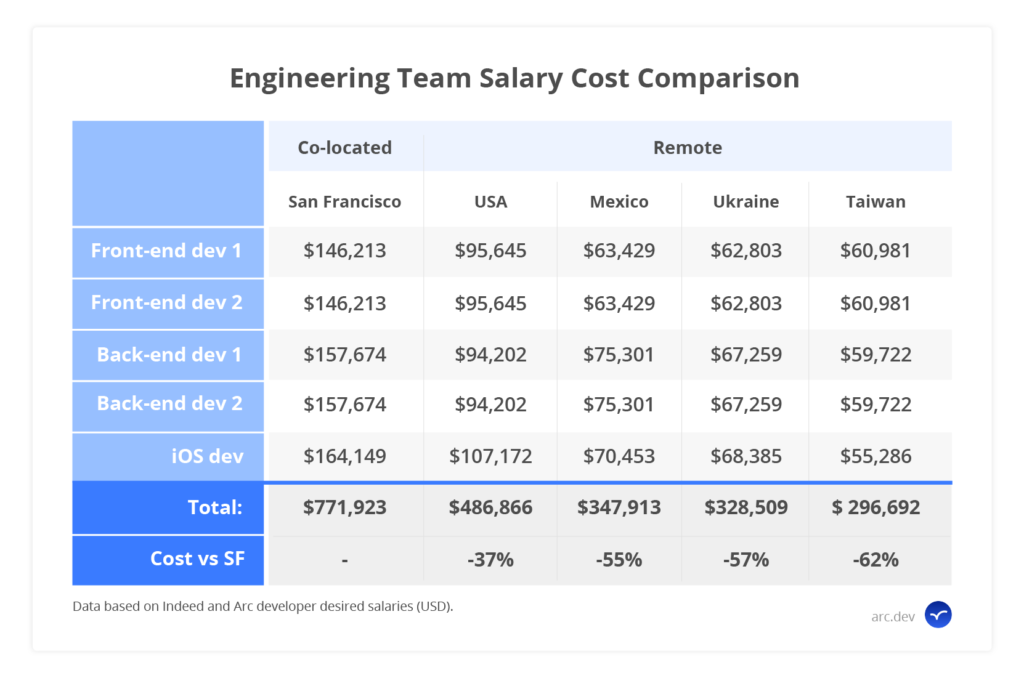We don’t yet know the full economic impacts of COVID-19, but one thing is certain: controlling costs should be top-of-mind for startups. As a defensive move in business, controlling costs is hard to match. One key strategy for doing this is fully embracing a remote workforce.
The current crisis has pushed remote work from a niche experiment side-eyed by VCs to a mainstream management practice, with companies like Twitter, Facebook, and Shopify all recently announcing they are going remote permanently.
Now that previously co-located startups have had time to adjust to this new way of working, it’s time to think about the wider possibilities: a world of great, affordable, and flexible talent at your fingertips.
Looking to hire the best remote talent? See how Arc can help you:
⚡️ Find the world’s top developers, designers, and marketers
⚡️ Hire 4x faster with fully vetted candidates
⚡️ Save up to 58% with global hires
Hire top talent with Arc risk-free →
Unpacking the Cost Savings of Hiring Remotely
It’s almost questionable to start your engineering team in the Valley.
Andreas Klinger, Former Head of Remote, AngelList
Remote work gives you access to affordable talent — but just how affordable? As one of the most expensive hires companies make, let’s use the cost of a team of engineers as an example.
Silicon Valley developers are the gold standard of software development. However, co-located talent in the Bay Area comes at a huge expense. In recent weeks and months, many have been questioning, in the time of remote work, if it makes sense to build software teams in such an expensive location.
If we cost out the differences between an engineering team built in San Francisco, and a team of remote talent, one thing is certain: the cost savings are significant.

(For this exercise, we’re using smoothed desired salary data averages for Arc remote developers who have passed Silicon Valley-equivalent technical vetting standards. The data for San Francisco is based on average salaries on Indeed.)
It’s immediately clear, based on these numbers, that hiring remotely saves salary costs — even when hiring developers solely within the United States.
Looking at talent further afield, the salary cost savings are even more significant. Even better, the quality of talent remains the same. While working with team members on the other side of the globe means your business processes must be optimized for working remotely/asynchronously, it also opens up the option of the sun never setting on operations.
On top of the striking difference in salary costs is the fact that the San Francisco salaries above only represent base salaries. Factor in health benefits, bonuses, perks (and potentially even equity), and you’re looking at significantly higher expenses. On the other hand, the salary expectations of remote developers generally exclude these extras (unless separately negotiated).
Read More: 13 Things Freelance Software Developers HATE Hearing From Clients
Competitive Advantages of Remote Work
Lower Fixed Costs
There is no appetite for money-losing Silicon Valley companies anymore.
Jason Calacanis, Angel investor and entrepreneur
Aside from the advantage of decreased payroll costs, fully embracing remote work also significantly decreases facilities/real estate spending (not to mention allowing your team flexibility to choose their preferred social distancing-friendly workspace!).
Startups should think carefully about to what extent real estate expenses are necessary, and whether they’d be more attractive to investors after further expense reduction.
Easier to Attract Talent
Another large shift brought about by the COVID-19 crisis is on the employee side. Now that employees have had a taste of the flexibility of remote work, will they accept being forced back to the office?
Startups often struggle to attract great talent, as they are competing with well-established companies. One way that startups can distinguish themselves in the hiring scene is by offering greater flexibility, including remote work options.
Read More: Andela vs Toptal vs Turing vs Arc: Which is the Best Andela Alternative?
Great Talent and Specific Skill Sets
Hiring remotely naturally gives you access to a significantly wider talent pool. Don’t keep competing with many other companies in a geographically-limited area — instead, seek out untapped talent worldwide.
Additionally, by hiring remotely, it’s also much easier to find talent with the specific skill sets you need.
Fast and Flexible Scaling
With the economic outlook so uncertain, it is a big call to make permanent hires. Recruitment is an expensive and risky activity at the best of times — and now startups have to be even more careful.
Remote work allows for more flexibility on both sides of the hiring equation. From short-term freelancers to contract-to-hire permanent options, startups can find the talent they need in more flexible, lower-risk formats.
This elasticity of talent means startups have greater control of workforce costs, while still having the ability to scale as needed. In particular, startups need to avoid the risk of having a too-small workforce once the economic recovery is underway, and thus missing out on the chance to grow fast.
Read More: 10+ Software Engineer Interview Questions to Find Top Dev Candidates
Wrapping Up
Embracing remote work as a long-term strategy makes sense for startups to stay competitive, especially during these uncertain times. Through remote work, you’ll not only attract great talent at budget-friendly price points, but also have more flexibility in your workforce size and scalability.
The decision to go remote can extend your runway now, but it will also make your organization more nimble and resilient in the long run — and better positioned to face the challenges ahead.
You can also try Arc, your shortcut to the world’s best remote talent:
⚡️ Access 350,000 top developers, designers, and marketers
⚡️ Vetted and ready to interview
⚡️ Freelance or full-time








